3/15/2010
Travel Report:Trip Notes from Florida
Story and photos Chris Beytes
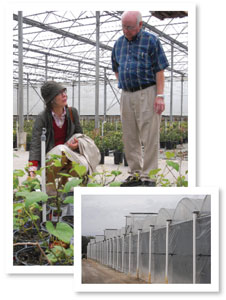 Dewar Nurseries, Apopka
Dewar Nurseries, Apopka
“Edibles” could be the next big thing beyond veggies and herbs, as growers explore vines and bushes, and retailers combine their fruit trees, grape vines and tomato plants into “edibles” departments. Dewar Nurseries, the country’s biggest rose grower, with more than 150 acres at three locations, is now doing an edibles program for Lowes featuring grapes, raspberries and more in colorful printed pots. Here, founder Alex Dewar describes the program to Anna. Dewar planned aggressively for 2010—they want a 28% increase in sales! We salute that kind of confidence.
This greenhouse at Dewar features Alex’s own open-roof concept. He brought the roofs over from Holland and installed them on every sixth bay of his poly house. The result is improved natural ventilation at a much lower cost than venting in every bay. Also, the houses are used from Holland, and he added 4 ft. to the posts when he set it up, giving him 14 ft. to the gutter.
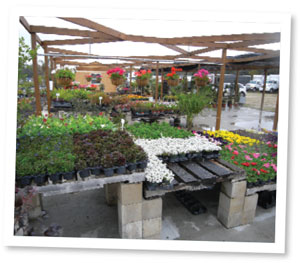
Knox Nursery, Winter Garden
Knox continues to do two things very well: They’re one of the South’s premier plug growers (no easy task in Florida); and they’re big into Ellepots—both finished bedding plants for resorts like Disney, and empty, ready-to-plant Ellepots for growers and grower/retailers. But Bruce and Monty Knox also recognize they’re in an ever-expanding residential area, which is why they’ve set up a small, casual garden center on their property. It’s nothing fancy now … but Bruce noted that they have property to expand on if it takes off.
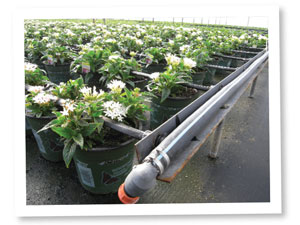 Riverview Flower Farm, Riverview
Riverview Flower Farm, Riverview
We stopped in at Riverview’s Wimauma location (former home of Florida Azalea Specialists), where we met brothers Rick and Dave Brown. Riverview is best known for two products. First is their line of “Florida Friendly Plants” which feature subcategories of perennials, drought-tolerant plants, hummingbird plants, natives, salt-tolerant plants and more. The gallon pot program goes to Home Depot stores throughout the state. Second is the cleverly named SausEdge—a foot long sideways Ellepot planted with border plants to make an instant landscape edging. But what we took note of was how Riverview waters all that material using this slick method of suspending irrigation tape over their crops. Clean, neat and purposeful.
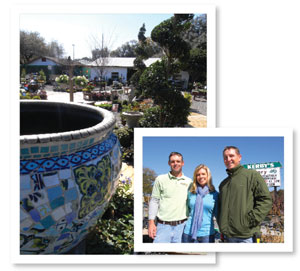
Kerby’s Nursery, Seffner
Husband and wife team Joey (right) and Kim Bokor and Kim’s brother, Mark (left) are a new young breed of Florida retailers—a state not known for its good independents, so that’s refreshing to see. They’ve taken over the business from their dad, who got it off to a good start. Now the second generation is taking it to a new place that Kim calls “Rustic Elegance.” First thing they did was swap the ground cloth and boring rows of plants for a curvaceous boardwalk that winds through the nursery. Watch for these folks to make a mark on the Florida—if not the national—retail scene.
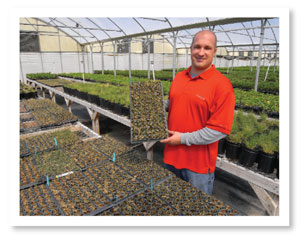 Sun-Fire Nursery, Sarasota
Sun-Fire Nursery, Sarasota
T. Jay Higgins got lucky when he bought his nursery in Southwest Florida: The former owner happened to be propagating some of Suntory’s new Sun Parasol mandevilla. T. Jay connected with Suntory and offered to continue the propagation, and today he’s doing more than 5 million Sun Parasol cuttings, along with bougainvillea and hibiscus for the Florida market. But T. Jay has some other projects up his sleeve. He’s got a consumer website, bigbadflower.com, where he sells liners to plant geeks at fantastic prices. He’s now growing plugs of buffalo grass, a native slow-growing turf. He may even open a second nursery to grow hydroponic vegetables.
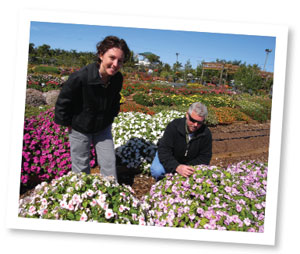
Costa Farms, Homestead
At Costa, Anna and I focused on their new trial gardens and research facilities (which Ball, Dümmen and Syngenta all help fund). In the trial gardens, we met new hire Kate Santos (pictured here with Costa VP LJ Contillo), a recent University of Florida PhD, who now runs Costa’s extensive R&D efforts. And they are extensive, from the large trial grounds, which will open to the industry every year starting in January at TPIE time, to the greenhouse trials of various crops, biodegradable pots, Aqualok and more. It’s all done to a university standard, thanks to Kate.
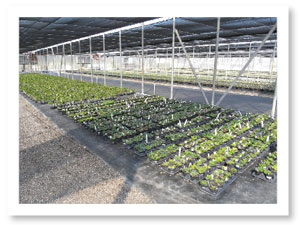 Pure Beauty Farms, Homestead
Pure Beauty Farms, Homestead
The folks at Pure Beauty Farms told me they prefer to keep a low profile, so most of our conversation was off the record. But they did give me the ok to write about a cool idea I found on their very tidy production range: these raised beds. They are formed from recycled asphalt that comes from road crews chewing up old pavement. They spread it, four trucks per bay, and roll it into a hard-but-permeable surface. At $165 for 20 tons, it’s cheaper than gravel, and once covered with groundcloth the beds are high, dry and clean, with no puddles or weeds as seen in most Florida ground beds. A cheap trick!
GT